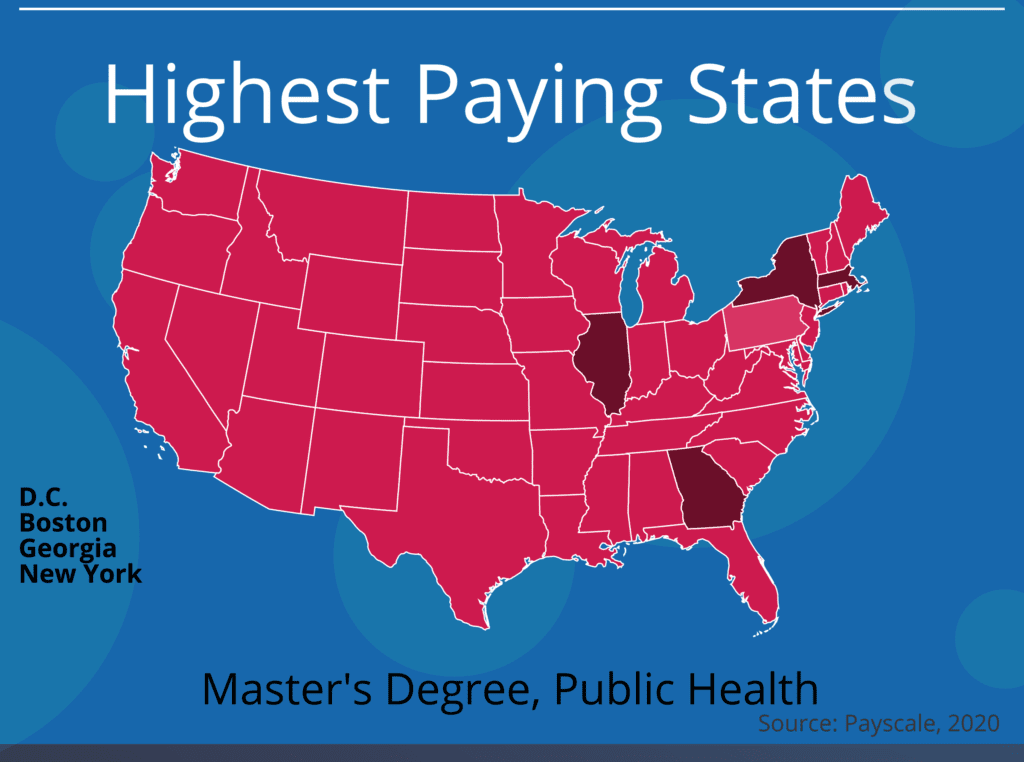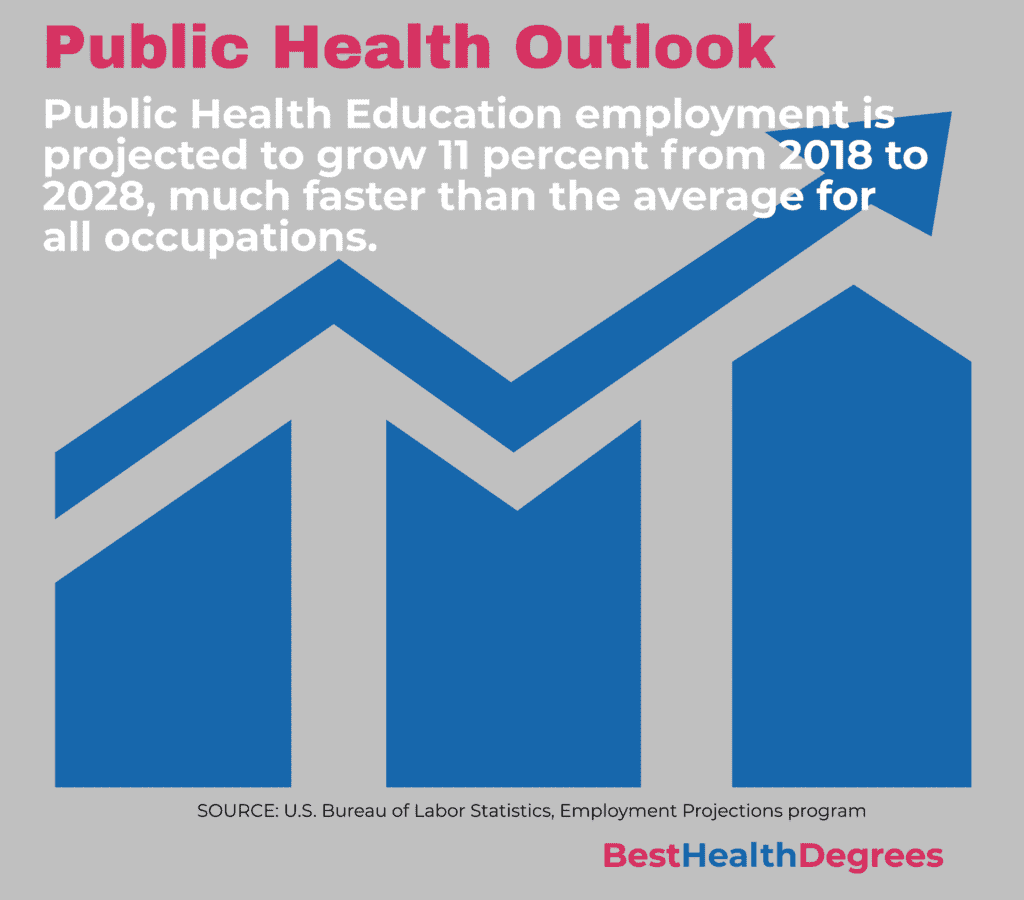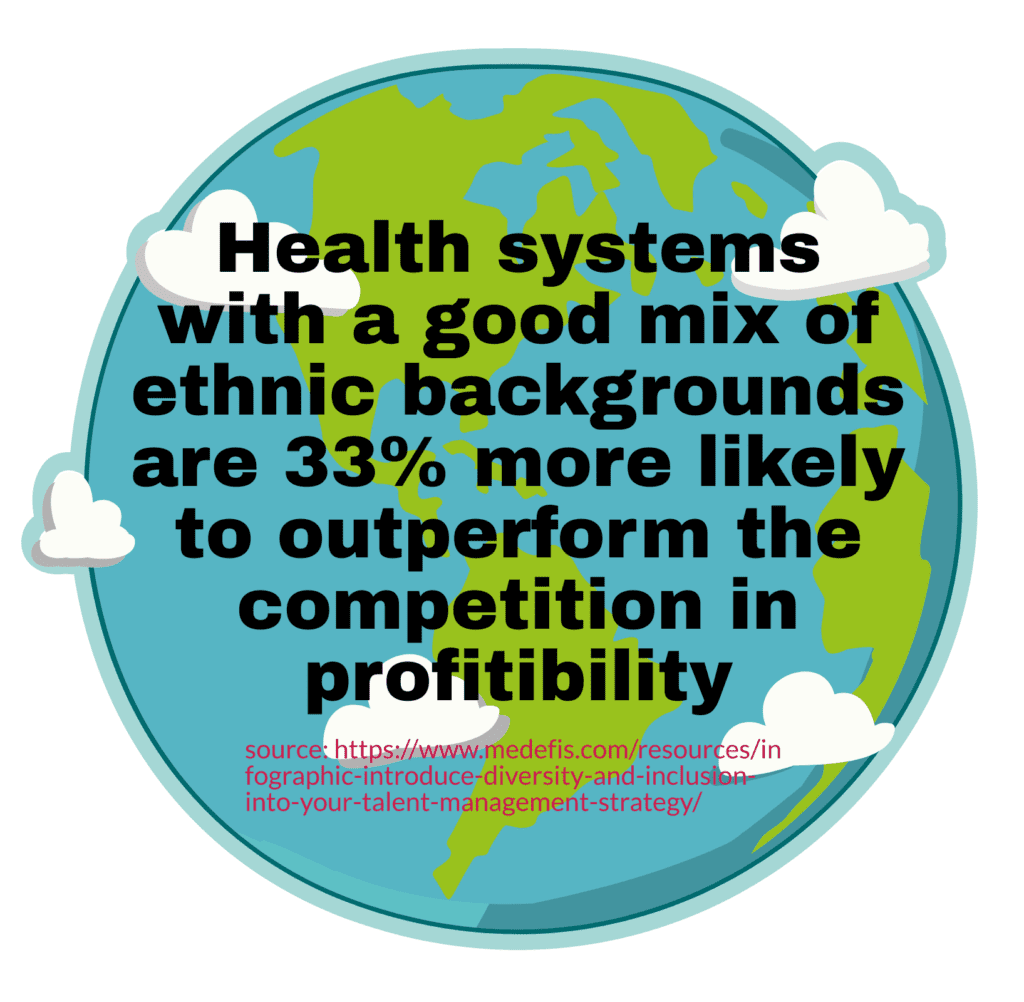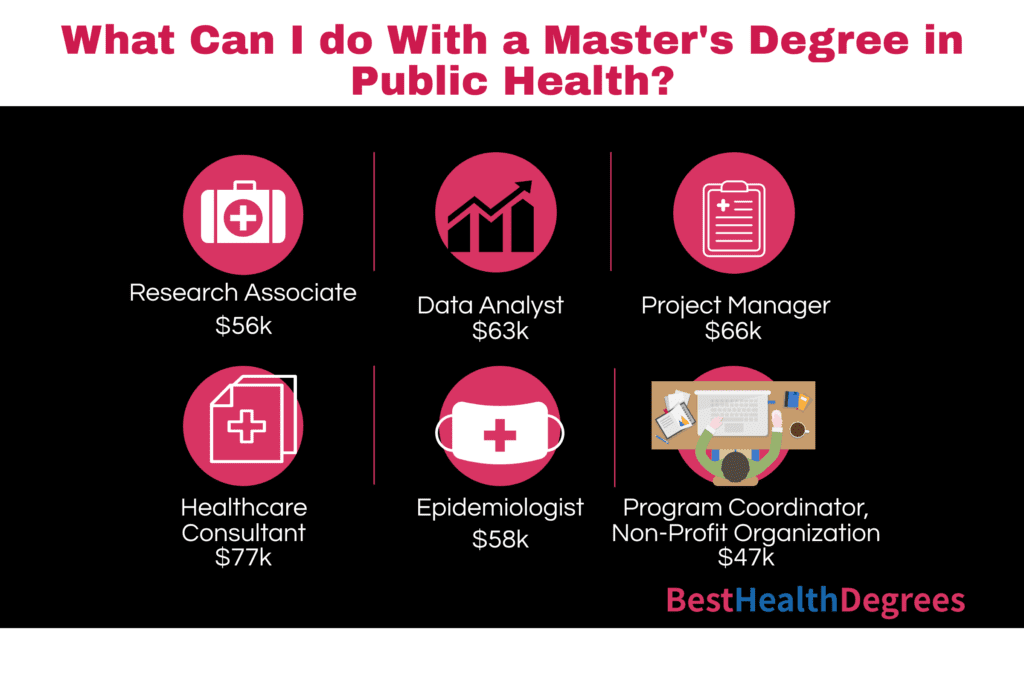Key Takeaways:
- Graduates can pursue diverse roles in epidemiology, health education, policy making, and management within public health sectors.
- MPH holders often work on initiatives to prevent health issues before they occur, contrasting with clinical roles that address existing health problems.
- An MPH can lead to high-level positions in public health, offering both leadership roles and potential for significant impact on community health.
- You can pursue an MPH through various educational formats, including full-time, part-time, and online programs, catering to different personal and professional schedules.
With a Public Health degree individuals can work in a variety of settings and with all size groups in the population to promote good health. Do you want to help a lot of people at the same time? With a career in public health, you can help entire groups of people stay healthy and safe.
One of the best ways to start a career is to earn an MPH, or a Master of Public Health degree program. If you’ve ever googled “why MPH” or “what is a Masters in Public Health?”, then this article is for you. You probably have a lot of questions about public health and its benefits. So, what can you do with a public health degree?
What is Public Health?
First of all, you can start with the basics. What is public health? Public Health is the science of keeping populations healthy. These health professionals work with groups as small as neighborhoods, as large as entire countries, and all population sizes in between. Public health prevents diseases, injuries, and mental health issues for the communities that they serve.

This prevention is what separates public health professionals from doctors and nurses. Doctors and nurses treat people who are already sick or injured. Public health professionals use education and safety measures to prevent those illnesses and injuries from hurting people in the first place.
This “prevention vs treatment” distinction is the most important one for those askers. Those whose main priority is treatment should look into getting a medical degree. Those who want to focus on prevention should look into getting a degree in public health instead.
What is the Importance of Public Health?
Now that the definitions are covered, what is the importance of public health? It turns out that the importance of public health can’t be overstated. Health can make a huge difference for countries and communities. By preventing diseases and injuries, health initiatives can help people live longer, healthier lives.
Parents can have more time to be there for their children. Children can avoid dreaded childhood diseases. People of all ages can improve their mental health and live happier lives. All of these positive changes happen thanks to public health workers. Public health workers empower people to make the best health decisions for themselves. As a result, people can enjoy their lives to their fullest potential.
What Can Public Health Majors Do?
Public health is important in part because the scope is so broad. When people think of public health, many picture things like vaccines and mosquito nets. Those things are definitely important pieces of the puzzle, but the scope of goes much further than that.
For example, the Johns Hopkins Bloomberg School of Public Health lists some of its recent projects on its website. Among other things, the site mentions bullying prevention, safe drinking water, and autism research. Even things like seatbelt initiatives and campaigns to keep recess in schools fall under the public health umbrella. Basically, if it has anything to do with human health, safety, and wellness, then it falls under the scope of public health.
What are the Benefits of Studying Public Health?
The benefits of earning a degree in public health include giving students a way to help lots of people at the same time. Plus, it’s a great choice for those who have curious and scientific minds. This field of health also gives students a huge range of career possibilities. You’ll read about potential careers in a later paragraph, but for now, just know that you won’t find any shortages in the job market. Not only are there lots of public health career paths, but the demand for these jobs is expected to grow. These careers are exciting, often social, and challenging.
MPH Degree
Now, if you do decide to study public health, you may want to go for an MPH degree once you finish your bachelor’s. Why pursue a master’s in public health? And what is a Master’s in Public Health? A master’s degree is an advanced degree that lets aspiring public health professionals dive deeper into the material.
Undergraduate degree classes cover the importance of public health as well as core science classes. But, master’s level classes and educational programs offer more understanding of the material. Additionally, students can add a concentration to their major for a more specialized career focus.
Why get a Master’s in Public Health?
A master’s degree in public health is the most common degree level among those who work in the field. Furthermore, the highest paying positions require a master’s degree. Having a master’s degree in public health gives you leverage when it comes to seeking promotions and salary increases.
School Program Accreditation
When looking for public health degrees, the first step is to look for accredited programs. If interested in a particular university, make sure that it’s accredited by either a national or regional accreditation program. These programs verify that a university meets high standards for education and covers the topics that students will need in their careers. Most accredited universities mention their accreditation status.

Accreditation is important because it ensures that students get the education that they deserve. Not every university is accredited. Non-accredited universities are often scams. They’ll take students’ money in exchange for a few surface-level “classes” that don’t mean anything. Upon graduation, students receive a degree that won’t get them anywhere. Some of these students won’t realize that they have a useless degree until they search for a job and come up empty. Employers know the difference between accredited and non-accredited schools. Always look for accreditation. Otherwise, you may end up wasting time and money.
How Important is CEPH Accreditation?
Next, look specifically for public health program accreditation. The Council on Education for Public Health (CEPH) awards accreditation to eligible public health school programs. The CEPH seal of approval tells future employers that you’ve earned a worthwhile public health degree. To meet CEPH accreditation criteria, programs must meet specific standards for leadership, effectiveness, course materials, and much more.
When a program has earned CEPH accreditation, it ensures students get a quality education that prepares them for a public health career. When a program doesn’t have this accreditation, however, then its students may be getting outdated or ineffective training. Once again, accreditation matters. You can find out if a program is CEPH accredited in the same way you’d look up school accreditation. Look at the program’s web page for any mention of CEPH. If you don’t find it, google search “[school name] CEPH accreditation.” If the program in question isn’t CEPH accredited, look for a different one.
Types of Public Health Masters Degrees
Next, potential MPH students will want to look at the different types of programs available to them. As it turns out, there are a lot of choices for those who want to get a Master in Public Health (MPH) degree. Of course, there are traditional programs for the Master of public health MPH.
Some students who attend college go to day and night classes, make school their primary focus, and then graduate in a couple of years. This method is simple and straightforward, so it appeals to a lot of students.
Degrees for Working Adults
However, that option doesn’t work for everybody. A lot of potential MPH students have jobs, families, and other day-to-day responsibilities that prevent full-time education from being a possibility. These students need a Master’s in public health degree that lets them balance their lives. Thankfully, a lot of schools have updated their programs for busy working adults.
For these busy students, online programs often make the best choice. Some MPH in public health programs are entirely online. Others provide a mixture of online and on-campus classes. For many online MPH programs, no GRE is required for admission. In any case, online classes provide a level of flexibility that on-campus classes don’t provide.
Accelerated MPH Programs
Students who need to graduate quickly can look for an accelerated MPH program. With an accelerated MPH program, students can earn their Master of Public Health (MPH) in less time than a traditional degree would take. Accelerated options are often the cheapest MPH programs because of the quick path to graduation.
Less time in a classroom means that there’s less to pay for. With student loans being as high as they are these days, students are looking for any opportunity to reduce those costs. These accelerated programs can be pretty intense though, so they work best for those who are both committed and disciplined. Many accelerated programs are also online, combining the best of two different options.
Public Health Degree for International Students
Next, there’s the Master’s in public health degree for international students in the US. Some international students bring their training back to their native countries, while others seek permanent residence in the US. Either way, with all of its education options, the US is a great place to attend a college of public health. Many places here can provide a Master’s in public health. In USA, for international students and national students alike, this kind of education is challenging but worth the effort.
Obviously, when it comes to education for public health, international students will get the same education as their US-born peers. However, many schools in the US have special programs to help international students succeed. For international students who want an MPH in the USA, full scholarships or partial scholarships may be available to help offset some of the costs of education. Counselors and advisors can also help these students make the most of school.
What Can You Do With Public Health Specializations or Concentrations?
So, what can you do with a degree in public health? Many schools offer graduate degree concentrations in different areas of public health. And, many of these concentrations in public health reflect today’s most pressing societal health needs. There are five public health degree specializations that are especially popular:
- Biostatistics
- Epidemiology
- Health Education
- Health Services Administration
- Environmental Health
Incidentally, these are also some of the highest-paid careers that students can pursue.
Many public health workers with bachelor’s degrees use their expertise to work as community health workers at local health organizations or government agencies. These public health agencies offer maternal and child health services that promote health.
Biostatistics
Biostatistics is one of the best areas to go into if you enjoy math. Among all of the concentrations, this one is perhaps the most focused on numbers. Biostatistics specialists measure medical data. Then, they use formulas to recommend the best health solutions from a statistical standpoint. They also participate in medical studies and report on the results.
Biostatisticians organize the collection of health-related data, analyze the results and promote planning and development where change is needed. The purpose of this field is to identify areas in the community that need improvement due to a lot of illnesses, injuries, or diseases.
Epidemiology
Epidemiology is one of the most pressing areas of interest. This MPH concentration focuses on infectious disease epidemics and how they spread. Epidemiologists work to stop major diseases from spreading any further. As disease prevention specialists, these community health workers work to ensure a community is safe from disease.
Epidemiologists research diseases and illnesses in their area. They examine the biological development and transmission of diseases to learn more about their lifespan. Then, a disease prevention specialist provides insight into how to care for and prevent the mass spread of illness. Epidemiologists can work for private research companies, medical facilities, or in government.
Public Health Education Specialists
Health education programs are some of the best concentrations for those who want to become teachers. Health Educators teach in a wide range of settings, but you often find them at local public health organizations and health departments. They educate students about best health practices, nutrition, mental health, and other related topics. Health promotion specialists and public health educators are similar roles.
Public Health Administration
Other key areas of specialization include health services administration. A Public Health Administrator and Health Service Administrator are both health experts and strategists. They often lead community health programs, manage hospital needs, or keep other healthcare facilities up to date. Health administration is a good concentration for those who want to develop their leadership skills.
environmental health
Finally, some of the top Master of Public Health specializations include environmental health. Environmental health specialists examine the impact of climate change on global health. Water pollution, hazardous waste, and other consequences of climate change are all environmental health concerns. Additionally, environmental health specialists educate people on how to protect themselves and others from the biggest risks.
Clinical Research Coordinator
Clinical research coordinators find research volunteers and obtain their consent for research studies. A public health researcher assists in the design, research, and analysis. Then they facilitate the delivery of results and health related community statistics from the research organizations to the proper agencies.
- Community Health Worker / Community Health Workers
- Health Education Specialist / Health Education Specialists
- Health Promotion Specialist / Health Promotion Specialists
- Public Health Advocate / Public Health Advocates
Those are just some of the many options available to aspiring professionals and students. If you’re interested in an MPH concentration, research career opportunities and see which ones line up with your interests.
Can You Earn a Degree in Public Health Online?
Yes. Students who need a flexible education can earn a degree in public health online or in person. So, many students who work and have families prefer online public health programs. Furthermore, there are online programs for undergraduate and graduate degrees, as well as those that offer public health certificates.
Internships and Practicum
Obviously, MPH students want to know how to get a job in public health. That is the end goal of an MPH, after all. Public health internships can help these students get started in their careers. MPH internship opportunities depend on a few factors. Some schools require internships and actively help students seek those internships.
These schools often partner with specific organizations that provide these students with the internships they need for real-world experience. In these schools, internships are part of something called a public health practicum, which is essentially a final project that prepares students for their future careers.

Even if you attend a school that does not require internships, it’s still a good idea to seek one during your second year in school. The importance of practicum to students can’t be overstated. Internships give students a taste of what life is really like in the field. Plus, internships often lead to full-time job opportunities. Furthermore, some students find employment from the organization where they did their internship. Even for those who don’t, an internship looks great on a resume and can help students get employment elsewhere.
A lot of organizations offer internships. There are some short-term CDC internships, for example. CDC internships offer excellent training and experience for students of all ages and educational levels. There are other public health practicum opportunities, too. Look into research facilities, educational facilities, health facilities, and similar places. The best internships are the ones that closely reflect your future job hopes.
Careers in Public Health
Is public health a good career? As long as you’re passionate about your job and want to make a difference, then yes. The field of public health provides plenty of stability and opportunity. Healthcare as a whole is expected to grow over the next year, and public health careers are expected to grow, too.
Careers in public health are diverse and far-reaching. The highest-paid public health professionals include public safety engineers, environmental scientists, healthcare administrators, biostatisticians, and epidemiologists. Those are far from your only choices, however. Careers in public health stretch all across the board, and with all of the expected job growth, you likely won’t struggle to find a good match once you graduate. Public health degree careers are especially accessible to those who do internships, so make your practicum a priority.
Salary shouldn’t be your only consideration for public health careers. When it comes to careers in public health, it’s important to choose a pathway that reflects your interests and passions. Careers in public health aren’t always easy. By seeking opportunities that align with your passions, you can avoid added stress and burnout in your MPH career.
What are Some Other Career Options?
As stated earlier, the public health job outlook is very promising, and there’s a need for professionals to fill in the gap in a lot of public health degree careers. One possible MPH career is becoming a dietician. Dieticians educate people, often one-on-one, about their nutritional choices and how those choices contribute to overall health.
Another possible MPH career is emergency management specialist. Emergency management specialists coordinate emergency plans and are ready to help enact those plans when the need arises. They can also educate organization owners and managers about proper emergency protocol.
For master’s in public health jobs that involve a lot of research, look into microbiology. Public health microbiologists study microorganisms, including the bacteria and viruses that cause major illnesses. Microbiologists play a huge role in developing new drugs and vaccines against diseases.
International Public Health Jobs
Many public health degree jobs exist outside of the US. International public health jobs let people make a difference in their lives all across the globe. These international jobs exist in government agencies, non profit organizations, international health organizations, and research labs. Entry-level international jobs may focus on population health problems and global public health initiatives. But it’s much easier to find international jobs with a master’s in public health than a bachelor’s degree.
The bottom line is that there’s far more than just one public health job description. Career researchers could write page after page on masters in public health jobs. You can choose from many jobs with a master’s in public health. Do your research on public health degree jobs, and then choose the path that aligns best with your needs.

Master’s in Public Health Salary Expectations
A master in public health salary depends on the job that you go into. As stated above, career paths vary a lot, so public health salary information can be tough to pin down. The highest public health careers salaries go to health and safety engineers, environmental scientists, healthcare administrators, biostatisticians, and epidemiologists.
- According to the US Bureau of Labor Statistics (BLS), the median pay for Epidemiologists is $78,830 per year.
- According to the US Bureau of Labor Statistics (BLS), the median annual wage for Health Education Specialists and Community Health Workers is $48,860 per year.
Not every public health salary will reach that high. Your masters in public health salary will likely start much lower, especially if you’ve never worked in public health before. All of that said, a public health salary can certainly leave you financially comfortable. Plus, the longer you stay in the field, the better your prospects of raises and promotions.
Professional Organizations in Public Health
Finally, take a look at some professional organizations in the public health field. Public health organizations provide some great opportunities for networking, continuing education credits, and mobility within the job market. The CDC lists several public health organizations that you can join. You’ll find those organizations on the CDC’s website or on the list below:
- American Public Health Association
- National Commission for Health Credentialing, Inc
- Public Health Learning Network
- Society for Public Health Education
Take some time to look into these public health organizations. They all help public health professionals to meet other public health professionals. They also help public health workers find educational opportunities and stay up to date on what’s going on in the public healthcare world. One of the best things that public health workers can do for their careers is to join one of these organizations.
Your Career
This diverse field has a direct impact on health and safety, public health policy, and health standards. So, students interested in this career path can work in occupational health and safety, public health policy, or help prevent communicable disease outbreaks. Public health offers many advanced roles at non profits and government agencies in the public health sector. So, if a public health professional is a good fit for you, start your journey today and enroll in an MPH program!
Related: